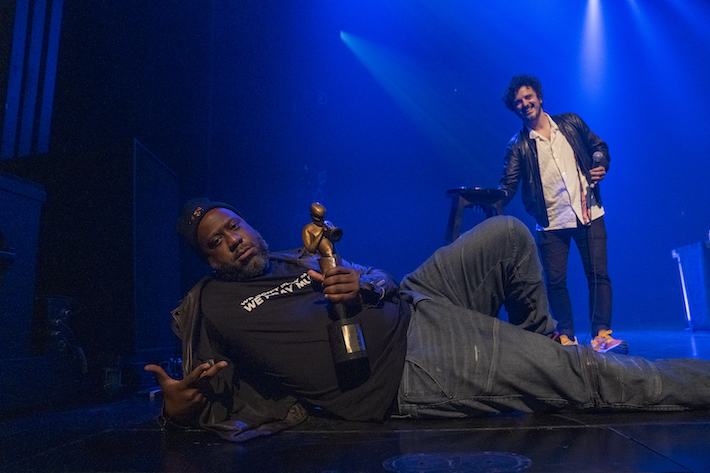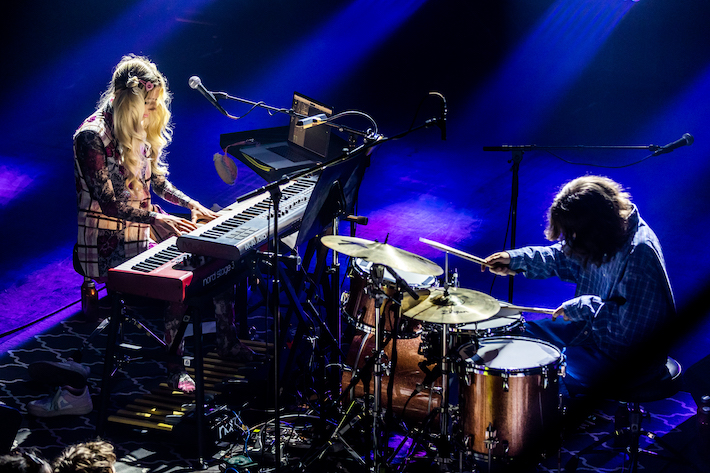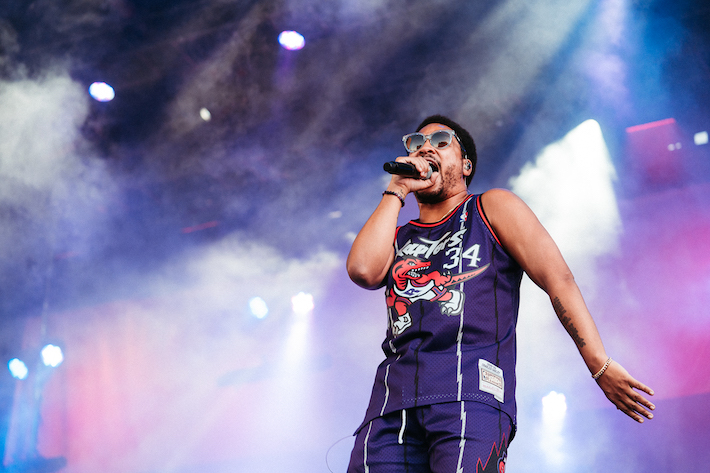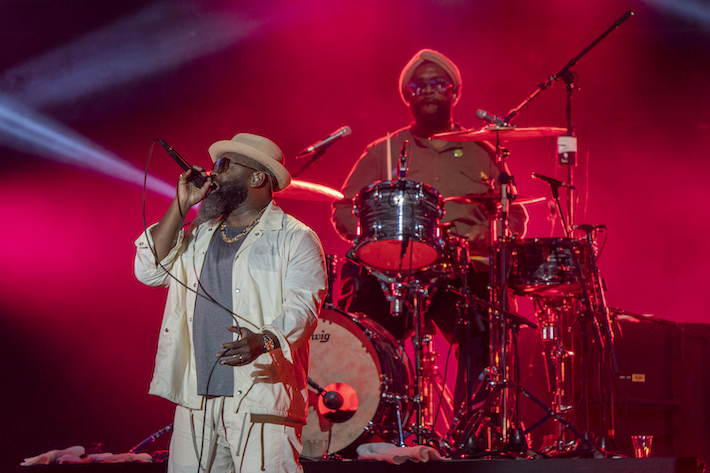
Victor Diaz Lamich
I should’ve known that something was in the air when the first songs I heard at the biggest jazz music festival in the world were by Outkast, Arrested Development, Common, and A Tribe Called Quest. As a warm-up to Robert Glasper’s Montreal Jazz Festival set at the grandiose Theatre Maisonneuve, his DJ Jahi Sundance coursed through those ’90s hip-hop classics, along with ubiquitous soul music cuts from Marvin Gaye, Minnie Ripperton, and even some Lenny Kravitz joints. These are by all means standards within Black music and hip-hop culture, but very much in contrast to the traditional sense of jazz standards.
Considering Glasper’s latest album, Black Radio III, came out earlier this year and was prominently featured during his set, Glasper used the evening to make a statement on the evolution of Black music. What was forged in jazz and then soul and R&B, now finds its heartbeat in hip-hop. And everything is connected.
Glasper’s performance came after Montreal Jazz Festival’s director of booking, Maurin Auxéméry, presented the pianist with the festival’s Miles Davis Award on stage. It’s an award that recognizes an artist for, “…their influence in regenerating the jazz idiom.” And while people like Herbie Hancock, Chick Corea, and Sonny Rollins had won it in the past, Glasper — who beyond his solo work has worked prominently with Kendrick Lamar, Yasiin Bey, Erykah Badu, and Lauryn Hill — was the first recipient whose career was inextricably tied to hip-hop as much as jazz.

Victor Diaz Lamich/Montreal Jazz Fest
This notion of hip-hop’s essential role in shaping the future of jazz music was ever-present throughout my four days in Montreal. Within the 350 concerts (mostly free) across ten days spread out throughout Downtown’s Place des Festivals, hip-hop’s very fabric was around every corner. And I was privy to hip-hop’s stewards of jazz music everywhere, all the way down to a full circle moment in an unforgettable grand finale.
On my first night, I saw emerging jazz-hop duo Domi & JD Beck totally dominate their set at Club Soda. The pair are the first act signed to Anderson .Paak’s Apeshit Records label and Paak has taken them under his wing as he helps push forward one of the most exciting new acts of the year. Domi Louna’s dizzying dance from keys to MIDI bass and JD Beck’s unfathomable work on his snare and kick drum are a sight to behold. They played tunes from their upcoming album, Not Tight, but also wowed with a Madvillain medley that made them go viral on YouTube. With Domi & JD Beck, jazz is hip-hop and hip-hop is jazz; the line is blurred in incredible and fascinating ways. And as jazz takes on a new face as it embarks into the future, no Gen Zers embody it better than these two, who are already masters at their craft.

Frédérique Ménard-Aubin/Montreal Jazz Festival
Outside of the club, even the street musician who played saxophone on the corner has expanded his act. He’s still blowing into his sax, but now he’s doing it over Brooklyn drill beats and rapping in between breaths. The next day, a beat-boxer joined him to warm up the passersby to what lay past the festival partitions.
With an unprecedented two-thirds of the programming at this year’s Montreal Jazz Festival being free, new stage environments were set up that made for the fest’s biggest Downtown footprint ever. The Pub La Traversée Molson Export hosted chilled-out jazz acts like Japanese trumpet player Takuya Kuroda. Kuroda rose to prominence with his collaborations alongside jazz and hip-hop vocalist Jose James, including one of the greatest renditions of Roy Ayers’ classic “Everybody Loves The Sunshine” you’ll ever hear. His set proved a relaxed gathering place for a twenty-something son and his parents, older folks perched above on a cafe terrace, and a Bohemian young couple with a stroller drinking beer while dancing with their baby, as their friends smoked a joint next to them.
The makeup of the crowd at Montreal Jazz Festival is a constant reminder of how well-funded arts programming (with support from the Canadian Government through the Canada Economic Development for Quebec Regions initiatives) directly increases access to people of all socioeconomic backgrounds. This much was evidenced everywhere I turned as attendees were exposed to a range of artists, sometimes not knowing what they were in for.
The best stage banter and one of the most refreshing performances I heard all week had to be from Edmonton rapper Rollie Pemberton, better known by his stage name, Cadence Weapon. “This song is from my album, Parallel Worlds, which won the Polaris Music prize last year. And that, my friends, is how I ended up here on the Montreal Jazz stage,” he said with a chuckle, introducing “Play No Games.” And then before they realized what hit them, three generations of a family in front of me were hearing Pemberton spitting lyrics like, “My Prime Minister wears Black face, but no he don’t really wanna face no Blacks.”

Marie Emmanuelle Laurin/Montreal Jazz festival
Cadence Weapon performed on the Rio Tinto Stage — the festival’s 2nd largest outdoor area — and people were covering every inch of the tiered seating plaza. He made sure to shout “F*ck Rogers!” as the largely Canadian crowd found solidarity in the communications company’s widely-publicized weekend-long outage — which coincidentally forced The Weeknd to cancel his hometown performance in Toronto that same day. But it was how the Cadence Weapon set morphed from Pemberton — in a slick Toronto Raptors Charles Oakley kit — in front of a laptop solo to begin the set, to then being backed by a full band, even including a cellist and a sax player, that kept him connected to the stratified crowd. This was raw, pull-no-punches hip-hop that took on more expansive life with the jazz band behind him. It showed a polymorphous rapper offering a different dimension to how he’s presented, without changing a thing about how he delivers his pointed messages.
And as the festival started coming to a close, nobody showed the power of hip-hop as an elevator of jazz music forms quite like The Roots. The world’s most well-known instrumental hip-hop band changed the face of the genre forever — and even brought it to your network TV lineup on The Tonight Show.
Hip-hop has been among the most progressive art forms of the last three decades-plus and The Roots are a perfect reflection of that. Their closing set on the festival’s Main TD Stage in the heart of the Place Des Festivals was glorious. They’re the group who can find common ground with the masses by playing pop culture staples from Kool & The Gang and 2Pac to Manu Dibango and Erykah Badu, in a cascading arrangement led by Questlove’s incredible breaks. But then, create life-affirming moments with modern-day hip-hop standards like “Proceed,” “The Next Movement,” and the uncanny melody of “Act Too (The Love Of My Life)” reverberating through the crowd that went on as far as the eyes could see.

Victor Diaz Lamich/Montreal Jazz Fest
Black Thought was divine. No MC can lead an explosive band of jazz musicians into one of the greatest live hip-hop acts on the planet like this. We should all know this much to be true by now. Later in the night, Questlove would play an unannounced DJ set at the intimate Club Rio Tinto venue a stone’s throw away from where the band was closing their set with “The Seed 2.0” into a rendition of Curtis Mayfield’s “Move On Up.” And I couldn’t escape what The Roots have come to represent in this new millennium.
Here was a group that I saw live for the first time on stage at a rave in Los Angeles in 2000, closing out the largest jazz music festival in the world in 2022. They did it all with hip-hop as the touchstone for all of the music and art that they create. And this year at Montreal Jazz Festival, they embodied the inescapable force that hip-hop wields in culture, in jazz, in humanity, and throughout the world.
Uproxx was hosted for this event by Montreal Jazz Festival. However, they did not review or approve this story. You can learn more about the Uproxx Press Trip policy here.
Continue reading...